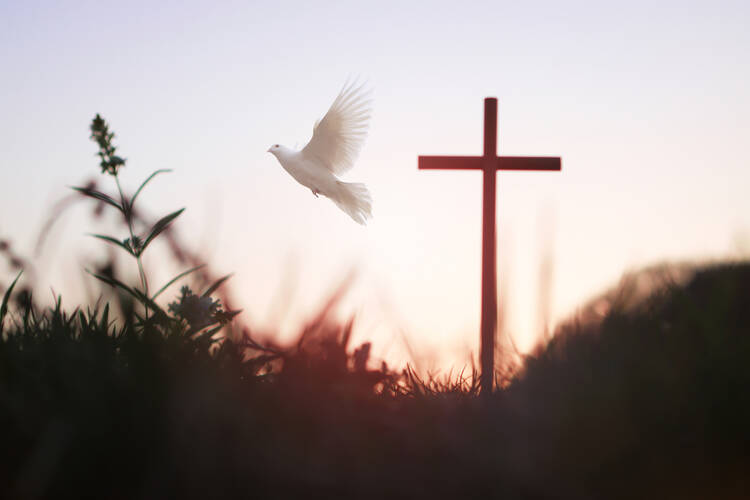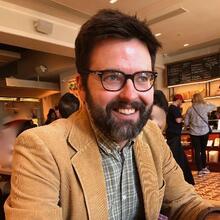It’s a holy day of obligation again. I set my alarm clock early and wolf down breakfast. Of course, I can’t receive Communion, because I had to eat breakfast in the 15 minutes before Mass. Normally, I would help the toddlers transition from sleep to breakfast table, but I will head straight to work after Mass, so no chance for time with my children in the morning. I will not really see them in the evening either, as my wife will have to take the kids to Mass then. I’ll try to throw together a dinner for them beforehand (meaning she won’t be able to receive the Eucharist either) or after (meaning the toddlers will be too tired to eat, leading to outrageous levels of grumpiness). Sometimes, we all go to Mass together in the evening, but that means we have to cut out our family dinner time and replace it with chicken nuggets in the pews for the kids and an ill-timed fast for my wife and me. In all of this, it is hard to find festivity. Just an additional obligation to add to the to-do list.
A holy day of obligation is a feast, a solemn and high and holy feast but, more often than not, it certainly does not feel like one.The Code of Canon Law states that on Sundays and holy days, Catholics should attend Mass. They are also “to abstain from those works and affairs which hinder the worship to be rendered to God, the joy proper to the Lord’s Day, or the suitable relaxation of mind and body.” What a beautiful law! What we abstain from is the stress and strain and busyness of life to make room for worship, joy and relaxation. In Latin, relaxatio is to loosen or stretch out, like one does on a lawn chair on a lazy Sunday afternoon.
Mass attendance on Sundays is an obligation too, but perhaps because it can be built into our weekly routine, it feels different. I love Sundays, love going to Mass with the choir singing and our troop of servers on the altar. I know it is obligatory, but it does not feel like a burden. To celebrate with the body of Christ as we receive the body of Christ, to kneel before the holy sacrifice, to call down the Spirit into our lives and to try (and often fail) to bring that Spirit into the world as the tabernacles we have become through reception is, in short, the best.
Amidst the theological are the joys of the mundane: seeing my children light candles and awkwardly kneel at Mary’s altar, chatting with the old usher who has been around forever, and with the young adult who just moved to the neighborhood. The joys of community are present in the parish hall when the head of our parish finance council makes 200 pancakes for us. It is a gift to know that I will have some time to breathe in the afternoon. Time, too, to crack a beer while I make a meal from either my Irish heritage or my wife’s Venezuelan culture. I keep these Sabbaths holy because they keep me holy. Those days are holy because they are set aside. I become holy in them because I am set aside from the work and the rush and am set aside for God and others. To call this obligatory is, in many ways, to miss the point. Sundays are a feast!
But holy days of obligation are a different matter. Too-often they feel like obligations with barely any holiness and no feasting. That it is so easy to turn them into an acronym (HDO) fits a culture of spreadsheets and work management platforms. What kind of celebration is it to miss wake-up time with my kids or dinner as a family? The presence of obligation without the reality of feast drains life from these days. Some readers might be thinking that I am a typical millennial whining about ‘obligations.’ Even worse, what kind of lousy Catholic is this writer? I deny nothing. I am a millennial, I whine, and I am a lousy Catholic. And yet, I think the church—from the laity to parish priests and the bishops—need to start rethinking our approaches to these holy days.
Jesus warns of those who “tie up heavy loads, burdens that are hard to carry, and place them on people’s shoulders, but they will not lift a finger to help them” (Mt 23:4). For many Catholics, getting to Mass on a holy day means going on a weekday while still trying to fit in all one’s regular earthly obligations. It feels like a burden amidst the full workday, commutes and school. Everyday is a day of obligation; holy days can feel like just one more obligation.
It might seem that I am proposing we drop the obligations and let Catholics go to Mass if and when they feel like it. Or to transfer the celebration of these holy days to coincide with regular Sunday Masses. Not necessarily. If anything, the American church needs to restore the observation of the Ascension to Thursday throughout the United States, and it should celebrate the Epiphany when everyone else everywhere else celebrates it on January 6. These feasts are central to the meaning of our faith. And obligations are gifts. They pledge us to live out love because we so easily forget to do so. To inhabit them richly is to know what Dorothy Day calls the “duty of delight.”
What we need to do is lift a finger to help people inhabit these holy days as feasts. Catholic organizations can start by giving employees and students these feast days off (looking at you, Villanova). In this, they can be a witness to the centrality of the feast. Bishops should explicitly state that employers should recognize these feasts as valid days to take off. Likewise, pastors should propose that people consider giving or taking the day off.
Just as Sundays center on the Mass but radiate outward in a spirit of rest and festivity, so too should holy days of obligation. If we treat the day as a celebration, then the Mass will feel less like an additional task and more like the greatest celebration (which it is). Parishes can think of creative ways to make these days more festive. Order breakfast sandwiches to be served after Mass in the morning or serve pizza and beer after the evening Mass. Individuals and families should help with this, too. Chip in to make liturgies more festive by volunteering to serve, sing and read. Want a feast at your parish after Mass? Help plan it. If possible, take the day off or get out of work early. Tell your boss why. Volunteer to help with child care or rides for families whose work schedules may be less flexible, so that they can make Mass, too. Try to make it a point to create a celebration in your home so that the day becomes not an obligation but a delight.
Catholicism is a religion of festivity. Our capitalist world has little room for that. We are used to the obligations of work and buying stuff. As Joseph Ratzingerwrote, the “Church will have to learn again how to celebrate holy days, how to radiate their brightness.” The compromise of holy days creates workday feasts that dim that brightness. We need to learn how to celebrate these holy days. The in-between option we have settled on doesn’t seem to work. Take these days back from capitalism and return them to Catholicism. If we cannot collectively do this for all of them, then maybe we do need to consider reducing the number of holy days and focusing on the big ones (I would argue for Ascension, All Saints and Epiphany).
I am going to do what I can to try to live out all of these holy days with more intention and festivity. This August, on the feast of the Assumption, I am taking the day off, hanging out with my wife and children, celebrating with my fellow parishioners, going to Mass like it is not an obligation, and delighting in the radiating joy proper to a feast day of the Lord.








